Looking for:
- Benzac AC - Pharmasave - PharmasaveCan you buy benzac over the counter
The ingredient's ability to squash acne-causing bacteria in its tracks is especially important because it means that, in some cases, it can be used to tame acne in place of antibiotics. And we all know what happens when antibiotics are used for too long: resistance. Using benzoyl peroxide, either in place of or in combination with antibiotics, helps to mitigate the issue.
"The benefit of using [benzoyl peroxide] is that you don't have to rely on an antibiotic to keep the bacteria load on the face down, and this helps reduce the risk of antibiotic resistance," Dr. Jerdan explains.
What types of acne does benzoyl peroxide treat?
"Although it can work for all types of acne, it can be especially helpful for the red, inflamed bumps," Dr. Garshick explains. Dr. Krant concurs, saying that while it can help with acne in all of its many forms, benzoyl peroxide is "more obviously effective with comedonal (black and whiteheads) and pustular (small red bumps with white tips) [acne]."
In some cases, however, benzoyl peroxide can also help with cystic acne, which is the deepest, and most painful, type.
What is the best way to use benzoyl peroxide to treat acne?
You don't need a prescription for benzoyl peroxide. Like we said, take a stroll down the drugstore skin-care aisle and you'll spot it everywhere. The percentage of the ingredient in over-the-counter products ranges from 2.5 to 10 percent, however, it's not necessarily the percentage you should be focused on.
Interestingly, both Dr. Krant and Dr. Garshick maintain that benzoyl peroxide is just as effective in treating acne at 2.5 percent and 5 percent as it is at 10 percent. The difference, both dermatologists say, is that the higher percentages run the risk of irritating or drying out the skin too much. While everyone's acne is different, in general, Dr. Jerdan advises patients to stick within the 3 to 5 percent range.
In addition to this wide range of active-ingredient percentages, benzoyl peroxide also comes in a wide range of different product types. You'll find it in facial cleansers, scrubs, masks, spot treatments, and other types of leave-on creams. With so many options, how are you supposed to choose the right formulation and product type?
Kathryn Dempsey, M.D., a board-certified dermatologist in Alabama, suggests the following guidelines. For rinse-off products, such as a cleanser or scrub, start with 4 percent and increase, as tolerated, up to 10 percent. On the lower end of the spectrum, we love PanOxyl Acne Creamy Wash and Paula's Choice Daily Skin Clearing Treatment.
For spot treatments, leave-on creams, and face masks, Dr. Dempsey suggests starting with 2.5 percent and working your way up to 5 percent. Try Neutrogena's On-the-Spot Acne Treatment or Rapid Clear Stubborn Acne Daily Leave-On Mask, both at 2.5 percent, or Glossier’s Zit Stick, which is formulated with 5 percent.
Again, though, everyone's skin is different, and if you are experiencing painful, stubborn acne, it's always wise to consult a board-certified dermatologist who can help you put together a tailored regimen.
- Can you buy benzac over the counter
Back acne: How to see clearer skin
Diseases & conditions
Featured
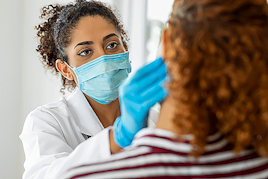 Monkeypox: What you need to know
Monkeypox: What you need to knowMonkeypox is a contagious disease that causes a rash. A board-certified dermatologist explains what the rash looks like and when to seek medical care.
 When to treat molluscum contagiosum
When to treat molluscum contagiosumThis contagious skin disease will usually clear on its own, but sometimes dermatologists recommend treating it. Find out when.
Everyday care
Featured
 Practice Safe Sun
Practice Safe SunEveryone's at risk for skin cancer. These dermatologists' tips tell you how to protect your skin.
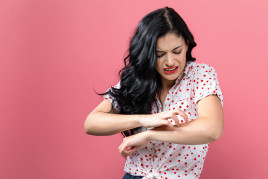 Relieve uncontrollably itchy skin
Relieve uncontrollably itchy skinFind out what may be causing the itch and what can bring relief.
Darker Skin Tones
Featured
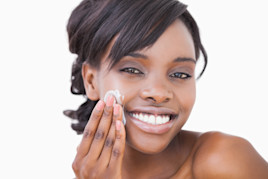 Fade dark spots
Fade dark spotsFind out why dark spots appear and what can fade them.
 Untreatable razor bumps or acne?
Untreatable razor bumps or acne?If you have what feels like razor bumps or acne on the back of your neck or scalp, you may have acne keloidalis nuchae. Find out what can help.
Cosmetic treatments
Featured
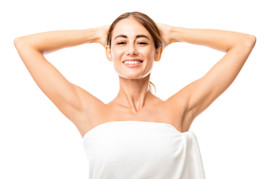 Laser hair removal
Laser hair removalYou can expect permanent results in all but one area. Do you know which one?
 Scar treatment
Scar treatmentIf you want to diminish a noticeable scar, know these 10 things before having laser treatment.
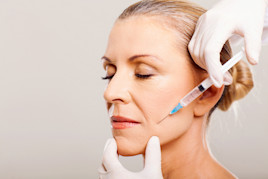 Botox
BotoxIt can smooth out deep wrinkles and lines, but the results aren’t permanent. Here’s how long botox tends to last.
Public health programs
Featured
 Free materials to help raise skin cancer awareness
Free materials to help raise skin cancer awarenessUse these professionally produced online infographics, posters, and videos to help others find and prevent skin cancer.
 Dermatologist-approved lesson plans, activities you can use
Dermatologist-approved lesson plans, activities you can useFree to everyone, these materials teach young people about common skin conditions, which can prevent misunderstanding and bullying.
Find a dermatologist
Featured
 Find a Dermatologist
Find a DermatologistYou can search by location, condition, and procedure to find the dermatologist that’s right for you.
 Why choose a board-certified dermatologist?
Why choose a board-certified dermatologist?When it comes to treating the skin, plenty of people say they have expertise. Only a board-certified dermatologist has these credentials.
Many medications can cause side effects. A side effect is an unwanted response to a medication when it is taken in normal doses. Side effects can be mild or severe, temporary or permanent. The side effects listed below are not experienced by everyone who takes this medication. If you are concerned about side effects, discuss the risks and benefits of this medication with your doctor.
The following side effects have been reported by at least 1% of people taking this medication. Many of these side effects can be managed, and some may go away on their own over time.
Contact your doctor if you experience these side effects and they are severe or bothersome. Your pharmacist may be able to advise you on managing side effects.
- dryness or peeling of the skin (may occur after a few days)
- feeling of warmth, mild stinging, and redness of the skin
Although most of the side effects listed below don't happen very often, they could lead to serious problems if you do not check with your doctor or seek medical attention.
Check with your doctor as soon as possible if any of the following side effects occur:
- painful irritation of the skin, including blistering, burning, crusting, itching, severe redness, or swelling
- skin rash
Stop taking the medication and seek immediate medical attention if any of the following occur:
- signs of a severe allergic reaction (e.g., hives; difficulty breathing; swelling of the mouth, tongue, lips, or throat)
Some people may experience side effects other than those listed. Check with your doctor if you notice any symptom that worries you while you are taking this medication.
Are there other precautions or warnings for this medication?
Before you begin using a medication, be sure to inform your doctor of any medical conditions or allergies you may have, any medications you are taking, whether you are pregnant or breast-feeding, and any other significant facts about your health. These factors may affect how you should use this medication.
Bleaching effect: Benzoyl peroxide may bleach hair or coloured fabrics.
Dry skin: If you experience excessive dryness of skin, stop using this medication, and talk to your doctor.
Sun sensitivity: Benzoyl peroxide can increase the sensitivity of your skin to the sun. Avoid prolonged exposure to sunlight and do not use sunlamps while you are using this medication. When you are exposed to the sun, be sure to use an adequate sunscreen and wear protective clothing (e.g., hat).
Pregnancy: Benzoyl peroxide should not be used during pregnancy unless the benefits outweigh the risks. If you become pregnant while using this medication, contact your doctor immediately.
Breast-feeding: It is not known whether benzoyl peroxide passes into breast milk. If you are breast-feeding and are taking this medication, it may affect your baby. Talk to your doctor about whether you should continue breast-feeding. Do not apply this medication near or on the breasts if you are breast-feeding.
Children: The safety and effectiveness of using this medication have not been established for children less than 12 years of age.
Compare benzoyl peroxide vs. Differin
Head-to-head comparisons of medication uses, side effects, ratings, and more.
ADVERTISEMENT
Benzac (benzoyl peroxide) is the most effective over-the-counter treatment for mild acne.
●●●●●
3.4/ 5 average rating with 394 reviewsforbenzoyl peroxide
Differin (adapalene) is commonly used for treating acne, but, it can cause skin irritation.
Upsides
- Available over-the-counter from many brands.
- Benzac (benzoyl peroxide) comes in many different forms and combinations with other acne products.
- Differin (adapalene) is a good option for the treatment of acne.
- It is available as a cheaper, generic medication.
- It only has to be applied to the skin once a day at bedtime.
- The 0.1% gel formulation is available over the counter, without a prescription.
- Differin (adapalene) is generally well tolerated, with few side effects.
Downsides
- Benzac (benzoyl peroxide) increases your skin's sensitivity to the sun and may also cause dryness or stinging.
- Be careful when applying Benzac (benzoyl peroxide) to large areas since it can bleach hair, clothing, and pillow cases upon contact.
- Benzac (benzoyl peroxide) needs to be combined with other medications to effectively treat severe acne.
- Your skin may look worse before it starts looking better.
- Differin (adapalene) can take up to 8 to 12 week to start working.
ADVERTISEMENT
Used for
Dosage forms
- Cream
- Lotion
- Liquid
- Gel
- Foam
- Soap
Price
Want to save even more money?

Sign up now for a 30-day trial and save up to 95% at CVS, Kroger, Albertsons, and other pharmacies.
Learn more
Reviews
Side effects
The Benzac (benzoyl peroxide) FDA package insert doesn’t have numbers about how common side effects are.
5possible side effects
Skin dryness
42%
Skin redness
38%
Skin scaling
35%
Persistent burning and stinging
24%
Persistent itching
21%
Risks and risk factors
Local skin reactions
- Soaps and cleansers with skin-drying effects
- Products with high concentraions of alcohol, astringents, spices, or limes.
UV and sunlight exposure
Severe allergic reaction


No comments:
Post a Comment